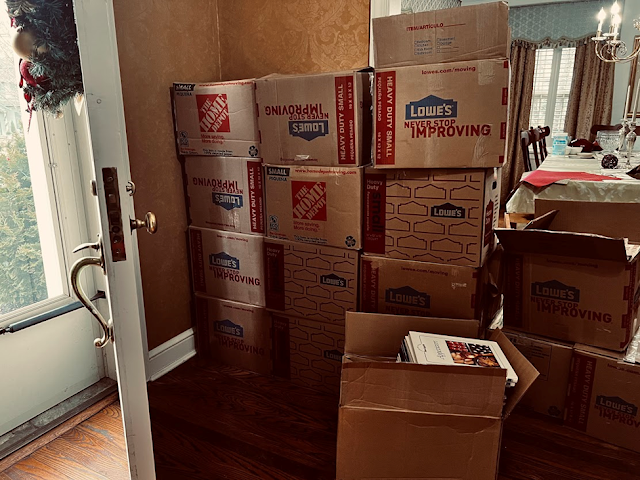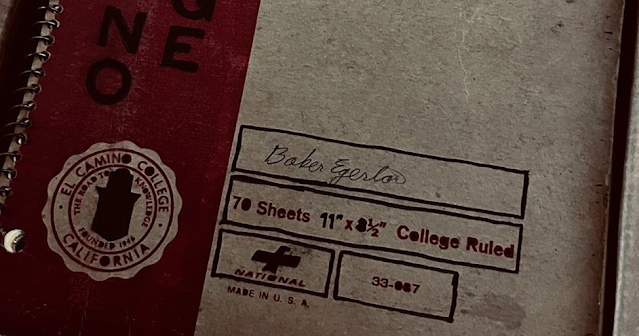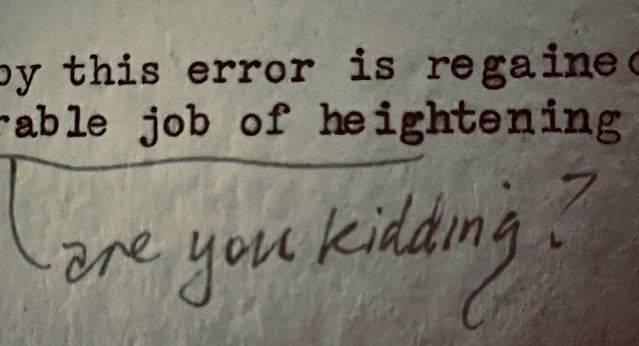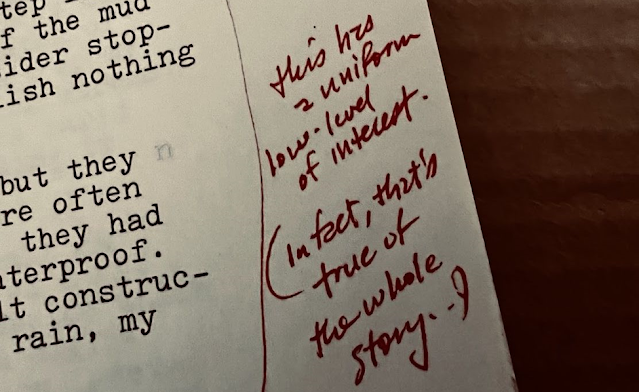This article was originally published on LinkedIn on December 27, 2021. It has since been updated to include a tribute to my Creative Writing professor from University of Redlands.
In the summer of this nearly-spent year, my wife and I moved into our “forever home”: the one from which we intend to be carried in box or bag when that time comes (decades in the future, God willing). We’ll never move again. And it's a wonderful feeling.
The process of moving into one’s forever home differs from the cross-town, intra-state, and inter-state moves of our past. There’s no longer any point to stowing boxes onto storage shelves “for later.” Every box, in due time, must be opened and challenged with discriminating eyes, its contents either preserved or discarded with merciless disregard for sentiment – if only to prevent our children from having to pore over masses of useless material once that time comes. Just as I have done.
We have a ponderous amount of clutter: boxes and boxes of books (some of which are gathered in the photo above for donation), plus stacks of papers, photographs, 35mm slides, paintings, tokens, knick-knacks, and a number of corporate promotional items, like an LCD clock from a decades-ago sales kickoff where the display flashes “SELL” off and on.
But as I dug deeper into the detritus that has gathered around us for decades, I found three small boxes filled with papers from my youth.
They include a stack of handwritten letters dating from the days before email, when long distance phone calls were expensive and letter writing was the most cost-effective form of communication. They were letters from school friends and friends from church and family, all of them focused on matters mundane.
There is the college work of a youth and aspiring writer. Spiral notebooks from California community colleges I’d attended as I began my journey through higher education on a budget. And notes, study papers, essays, and more from my demanding (but ultimately merciful) professors at the University of Redlands.
As I began picking through the pages, it was the collection of study papers, essays, and – especially – the efforts produced for many writing classes that induced my most powerful responses: cringes.
Poems and word-picture exercises written at age 17 in my first-ever creative writing class. (We devoted nearly three weeks to a study of "The Red Wheelbarrow" by William Carlos Williams.)
There were numerous stories, articles, and essays written for assignments in composition classes.
Critical essays analyzing media stories for mass communication classes.
Attempts at analytical thinking for philosophy classes.
Each of them is a evidence of a young mind and young man who was far from finding his voice, and far from learning to focus and shape his thoughts.
To look at the positive: these papers are reminders of how much I’ve learned as I’ve practiced my craft. I’ve striven to banish personality and pretense, allowing my writing to seep into the background. My goal is for business ideas to become the focus, not stylistic trills from an immature writer.
Today, as a business writer of some experience, each communication must meet certain self-imposed criteria:
Is it fit for purpose?
Is it aligned with brand, voice, and business strategy?
Is it being produced on time and within plan?
Does it, in the interest of consistency, follow a style guide?
Does it meet my own personal style and quality standards for syntax, spelling, grammar, and word choice?
And I’ve learned to consistently seek out and cherish that most important of considerations for any communication:
Clarity.
Clarity is so difficult to achieve against the cacophony of human context through which messages are filtered and filtered yet again.
I wasn’t born with writing skill. My papers make that amply clear. I’ve had to learn my craft through years of study, practice, and application. And no matter the level of one’s skill, it is hard – so hard – to write for an outcome when our ability to perceive the meaning of language, written or spoken, is dominated by the contexts of our readers: their history, education, training, language, culture, personal motives, their perceptions of organizational missions and messages – and vastly more variables, none of which I as a writer control.
But as writers we’re called upon, not to control, but to evoke. To transmit. And to seek clarity.
At last, from the comfort of my forever-home office, I share this personal writer's maxim:
Strive for clarity with everyone, and live at peace with all.
Happy holidays, and a happy new year to all in 2022.
UPDATE, March 15, 2022
The professor who brutally marked up my papers from my University of Redlands tenure was Les Wolf on the University's Creative Writing faculty. I was saddened to find this obituary from Les, who was one of those professors who had a pivotal affect on my then-young life. He introduced me to the experimental fiction of Donald Barthelme and Jorge Luis Borges among many others. Les was a meticulous dresser, sometimes teaching class in his "uniform": a navy blue, pinstriped, three piece suit with aviator sunglasses. He shared this anecdote once in class (paraphrased):
"I was browsing in a used bookstore in New York City when I saw a familiar face. From his book covers, I recognized Donald Barthelme. At the time I was wearing my suit: a navy pinstripe with aviator style sunglasses. I approached Barthelme and said, 'Are you Donald Barthelme?' Abruptly Barthelme glanced around him, perhaps looking for others -- and certainly looking for an exit. Finally he nodded and admitted, 'yes.' I replied, 'Hi, I'm Les Wolf and I teach creative writing. I'm a fan of yours.' Barthelme looked noticeably relieved."
LESLIE ERIC WOLF
Deceased May 3, 2012
WOLF LESLIE ERIC WOLF cherished son of the late Roslyn (nee Zehman) and Ambassador Milton A. Wolf. Devoted brother of Caryn (Steve) Wechsler, Dr. Nancy (Dr. Aric Greenfield) Wolf and Dr. Sherri Wolf. Loving uncle of Alia (Travis) Gorkin, Sophie and Sam Wechsler, Alexandra and Hannah Greenfield. Beloved nephew, cousin and grandson. Services will be held Sunday, May 6 at 2:30PM at THE PARK SYNAGOGUE EAST, 27500 Shaker Blvd., Pepper Pike. Interment Bet Olam Cemetery. Family will receive friends at the Wechsler's, 19601 Van Aken Blvd., Shaker Heights, Ohio SUNDAY FOLLOWING SERVICES UNTIL 8:30p.m., MONDAY & TUESDAY 1-3PM and 7-9PM. Friends who wish may contribute to the Leslie Eric Wolf Memorial Fund, c/o The Jewish Federation of Cleveland, 25701 Science Park Dr., Beachwood, Ohio 44122.
IN MEMORY
Les was brilliant in so many ways, as a thinker, artist, writer, teacher, critic, conversationalist and friend. He was good-looking as well, often hilariously funny and an accomplished tennis player. When Les overdosed on drugs 28 years ago, he nearly died. Instead, after spending many weeks in a coma, he awoke to a new and very limited reality.
At Amherst Les majored in English and wrote his thesis on James Tate, one of his poetic heroes. After graduating magna cum laude, he and his lifelong friend Virginia Campbell (Smith ’72) headed for Southern California. In 1975 he was accepted into the UC Irvine MFA program in poetry, where he studied under Charles Wright and Jim McMichael, receiving his degree in 1977. Almost immediately, Les landed a job at the University of Redlands, where he taught writing to, among others, my future wife Lissa (Redlands ’79). He also introduced us.
Les was a prolific writer, and his work as a critic earned him the respect of major figures like Tate and John Ashbery. One of his many published works is an excellent essay on Ashbery in David Lehman’s anthology Beyond Amazement.
The poets and painters Les most admired were ones who took risks in their work, as he did in his own poetry and, with disastrous consequences, in his life. I’ll never forget our last conversation, about a dream of his in which a mouse was crawling over the trigger of a loaded revolver.
Les spent the remainder of his life in the care of his family, near Cleveland, sustained by Virginia’s frequent visits and steadfast friendship. He remembered the past, could speak and had some use of his arms and hands. He couldn’t walk. The one time I visited him he was funny and gracious, as I remembered him.
James D. Miller ’72







No comments:
Post a Comment